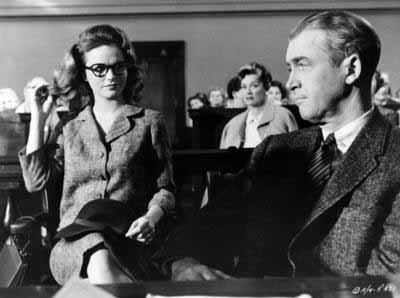In Harvey (1950), Stewart plays Elwood P. Dowd, a kind and pleasant man, whose best friend, after whom the movie is named, is a six-foot tall, invisible rabbit.
Since Elwood is the only person who can see Harvey, his family believes him to be quite out of his mind. Concerned, and more than a little embarrassed, by his behavior, Elwood's sister Veta Simmons (Josephine Hull), takes Elwood to the local sanitarium to have him committed. Elwood is escorted to a room, and Veta remains downstairs to talk to Dr. Sanderson (Charles Drake). Due to a series of miscommunications, the doctor takes Veta for the one who needs treatment, and has her committed instead. Elwood is brought back down from his room and the doctor apologizes to him. Dr. Chumley (Cecil Kellaway), the head psychiatrist at the sanitarium, fires Dr. Sanderson for his oversight. Elwood, however, is totally unfazed; he happily accepts the apology, and invites the doctor out for a drink at Charlie's, his favorite local bar.
Meanwhile, Veta has called her friend, Judge Gaffney (William H. Lynn), to help prove that she does not need psychiatric treatment. Realizing that Elwood is, in fact, the one who is hallucinating, everyone sets out to find him. When they do, he is having a drink alone, and explains that Dr. Chumley has left with Harvey. Elwood is taken back to the sanitarium for treatment. While they wait for him to receive his injection, the cab driver who brought them to the sanitarium asks Veta for his fare. She searches her purse, but cannot find her money. The cab driver refuses to wait until after the injection has been administered, so Veta is forced to interrupt the treatment to get the money from Elwood. He, of course, pays for it gladly and then returns to have the injection. However, Veta, fearing that the treatment will alter her brother's kind nature, stops the doctor before the injection is administered.
Dr. Chumley, who really can see Harvey, reinstates Dr. Sanderson, then sends everyone away without saying anything about the giant rabbit. Elwood stays a bit longer than the others, to say good-bye to his friend. But as he is leaving, Harvey changes his mind and decides to stay with Elwood.
I thought this was good, fun comedy of errors with a lot of heart. Stewart is charming as Elwood. Hull's Veta is appropriately obnoxious and entertaining. I liked the fact that there was no actor in a rabbit suit allowing the audience to see Harvey. It leaves room for the audience to wonder whether Elwood really is crazy, and it makes the moment when Veta changes her mind about Elwood's treatment more heartfelt and genuine. I don't think the film would have worked as well without those elements. At the end of the film, we get to see that Harvey does, in fact, exist. Once Elwood's treatment is cancelled, Veta finds her wallet in her purse. Did Harvey hide it, in an attempt to save his friend? I like to think he did. But it's not stated that Harvey is real until he starts to go stay with Dr. Chumley. Up until then, always polite, Elwood has opened the door for Harvey. Now though, Harvey opens doors for himself. Seeing doors swing open and closed on their own is confirmation that Harvey exists.
We follow up with Anatomy of a Murder (1959), in which Jimmy Stewart stars as Paul Biegler, a small-town lawyer defending Lt. Frederick Manion (Ben Gazzara), who stands accused of murdering the man who raped his wife, Laura (Lee Remick). In the courtroom, Biegler is up against the hard-headed Asst. State Attorney General Claude Dancer (George C. Scott), a man whose character is the opposite of Biegler's. It's a tough, complicated case. It seems that everyone involved could just as easily be guilty as innocent.
This is a fascinating film. First of all, it's got one hell of a cast. All are perfectly suited to their parts. Stewart's Biegler is still a good guy, but he's also a smart, fast-talking attorney who does what he needs to do to win his case. It's fun to watch, and play along, as he unravels the case. Gazzara is great in everything I've seen him in, and this is no exception. He plays the loving husband, but subtly shows the jealous side of the character. It's just enough to make you believe he could fly off the handle and commit the murder out of jealousy at seeing another man show interest in his wife. Remick walks the line between victim and seductress perfectly, so that when her innocence is called into question in the courtroom, you almost buy it.
Another thing I like about this film is how risky it was for its time. Frank discussion of such things as rape and women's panties may be commonplace now, but it was a shock to the 1959 moviegoer. Considering all that, plus Otto Preminger's direction, it's no surprise that this was nominated for seven Academy Awards, including Best Picture.


No comments:
Post a Comment